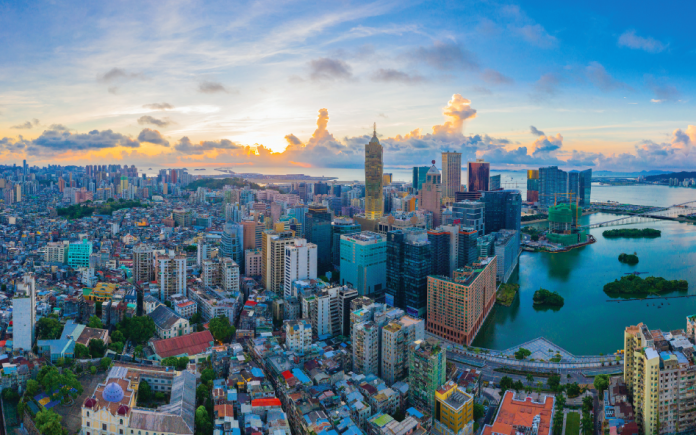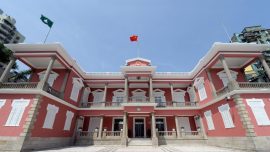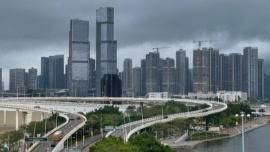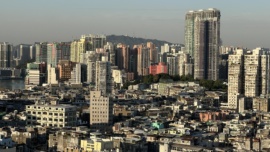Macau Business | November 2021
With no end in sight of the Covid-19 pandemic and its negative impact upon the economy, authorities juggle between how much should be spent to support the local community and how much should stay put in the public coffers
“If we don’t use the fiscal reserve now, then what is it used for?” Chief Executive Ho Iat Seng made this remark in early 2020 at the start of the Covid-19 pandemic, when the Macau government temporarily suspended the city’s casinos for half a month and was determined to splurge billions of patacas in spiking local economic activities and rolling out financial assistance for the general public.
Fast forward to nearly two years later. As this unprecedented public health crisis has persisted beyond the expectation of anyone, it has become increasingly challenging for the authorities to determine whether and how much to disburse funds from the fiscal reserve — when there is a no easy path for the recovery of the local economy while the public finance has been in the red for two consecutive years.
According to the Financial Services Bureau (DSF), the tax receipts on gaming — usually accounting for 70-80 per cent of the total government revenue — in the first three quarters of this year only reached MOP27.23 billion (US$3.4 billion), representing just 54.5 per cent of the 2021 annual target of MOP50.01 billion. Currently, the direct tax on the gross gaming revenue of Macau casinos stands at a rate of 35 per cent, but there are other levies on gaming for the purposes of public welfare, social and cultural affairs, making the total tax rate on casino gaming at 39 per cent.
The current revenue of the government in the first nine months hit MOP39.22 billion, or nearly 62 per cent of the annual target of MOP63.3 billion, in addition to over MOP37 billion from the fiscal reserve and other capital sources for a balanced budget, the DSF data said. Meanwhile, the government expenditures reached MOP61.72 billion in the first nine months, translating to an execution rate of 61.4 per cent of over MOP100 billion reserved for expenses in 2021.
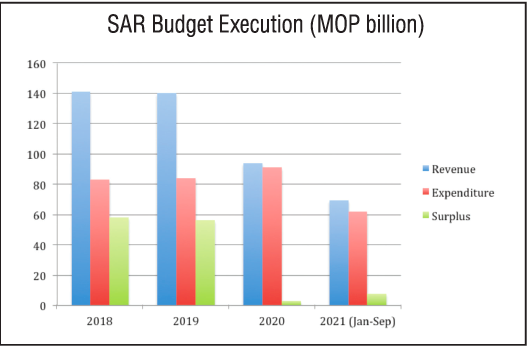
Thus, it came as no surprise that the administration unveiled in late October the budget for 2021 would be revised for the second time this year, in light of two rounds of new local infection cases in early August and between late September and early October that have severely dampened the local tourism and gaming sector.
Overlooked
The government expenses for this year would increase by MOP2.3 billion from about MOP100 billion, because eight new measures have been put forward in the same month amid the calls of the public to support local small-and-medium-sized enterprises (SMEs) and employees over the economic turmoil, the latest revised budget for 2021 shows. The measures include tax break for private property owners that reduce rents for their tenants; a one-off subsidy between MOP10,000 and MOP200,000 for business owners and freelancers that recorded no profits in 2020; MOP10,000 each for employees that had an annual income of less than MOP144,000 last year; and others.
Expecting about 103,000 employees — out of the employed population of over 376,000 — and about 15,000 businesses would be benefitted from these eight supportive measures, the authorities remarked in a statement this additional expense would be offset by funds allocated from the fiscal reserve.
Right after the announcement of these new measures legislators and many in the community across the political spectrum have been pressuring the authorities to enrich the content, or to be prepared for more supportive initiatives in the Policy Address for 2022, which will be unveiled later this month together with the budget for next year.
Legislator Ella Lei Cheng I criticised the coverage for the new eight measures are limited — those who have lost jobs or have been suffered from no paid leave this year, and those who have experienced significant declines in their earnings but their income level is still above MOP144,000 a year, are overlooked. “We have received some cases asking for help in recent times as they have lost their jobs this year and are facing financial difficulties,” the lawmaker from the Macau Federation of Trade Unions, the city’s largest labour group, illustrates. “We welcome the new measures from the government but more should be done to help more residents,” she adds.
“There’s still a long way to go for the recovery of the local economy and financial assistance [like the e-consumption voucher scheme] could help many resolve their immediate problems,” legislator Ella Lei
Her group has recently met with the Chief Executive to share expectations and insights for the Policy Address. One of the group’s proposals is to the fourth round of e-consumption vouchers worth MOP8,000 again for each resident, following two rounds last year and the third round earlier this year. “This measure could benefit the general public, lessening their burdens on living costs while spiking the local demand for merchants,” Ms Lei emphasised. “There’s still a long way to go for the recovery of the local economy and financial assistance [like the e-consumption voucher scheme] could help many resolve their immediate problems.”
Cautious usage
The government has so far kept mum about what would be in store for the upcoming Policy Address, and whether any changes will be made on the eight new measures, only two of which have been implemented so far. The administration has only remarked in a statement after meeting with representatives from the General Union of Neighbourhood Associations of Macau, or also known as Kai Fong in Cantonese, about the Policy Address that there “will not be any big changes” in the social welfare measures next year, but did not comment whether more supportive measures are possible. In another statement about the Policy Address, the authorities stated: “The formulation of policies and measures have to be based on objective data… under the premise of the cautious and efficient usage of the public coffers.”
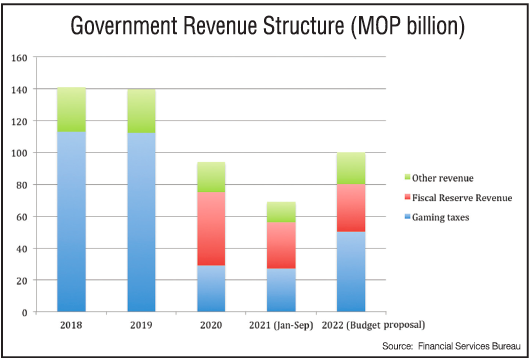
If no big changes are made, the government might likely keep the expense next year at about MOP90-100 billion, an average of the government expenditures in the past three years. This implies the gaming revenue might need to reach about MOP200 billion in 2022 — translating to about two-third of the pre-pandemic volume in 2019 — for a balanced budget, or funds have to be disbursed from the fiscal reserve again. Latest official figures said the gaming revenue amounted to MOP67.79 billion in the first nine months of 2021, up by 75.6 per cent from a historic low in the same period of 2020 but just accounting for over 30 per cent of the 2019 volume.
Joey Lau Chi Ngai, president of the Association of Economic Sciences of Macau, understands the government’s cautious approach in public finance. “The public income has drastically declined in these two years and there are a lot of uncertainties clouding the future economic fundamentals,” he says. “The government is obliged to ensure the public money is used appropriately and safely, and put the resources in the most necessary areas.”
“The resources of the government are limited… so the distribution of resources has to be accurate, cautious, effective and scientific,” he says, adding the eight new supportive measures are appropriate. “But the government should constantly evaluate the changes in the social and economic fundamentals [of the city] for any further action.”
Confidence needed
Since the establishment of the fiscal reserve law in 2011, the government drained funds from the reserve in history for the first time last year to afford its expenses. A total of MOP50.76 billion was taken out from the fiscal reserve in 2020 for a balanced budget, in addition to MOP35.69 billion this year before the second revision of the budget and at least MOP2.3 billion for the eight new measures in late October, according to calculations by Macau Business. Over MOP10.48 billion have also been depleted in the semi-autonomous, government-run Macau Foundation in the past two years for supporting businesses and workers.
Albeit a whopping amount of at least MOP88.75 billion has been taken from the fiscal reserve in the past two years, the value of fiscal reserve, according to the official date, totalled MOP651.26 billion as of end-August. The amount is enough for the city to eke out its expenses for six years with no income, assuming the annual expense at about MOP100 billion.
“The Government should give confidence to the community in this challenging time,” lawmaker Song Pek Kei
“The government should cautiously use its fiscal reserve — and that’s also the expectation from the community — as it’s not known at the moment how long this turmoil might last,” says legislator Song Pek Kei from the Macau Institution of People’s Alliance. Her group, linked to the local Fujian community and prominent local businessman Chan Meng Kam, has also met with Mr. Ho in recent weeks about the Policy Address.
One of the requests from the group is that the authorities should raise maximum cap for workers to enjoy the latest one-off subsidy MOP10,000 from the annual earnings of MOP144,000, or MOP12,000 a month, to MOP18,000 a month. The Alliance has also suggested the government should give a one-off subsidy of MOP10,000 for every resident besides the annual cash hand-out, as well as waiving the payments of water and electricity bills of businesses and residents for three months.
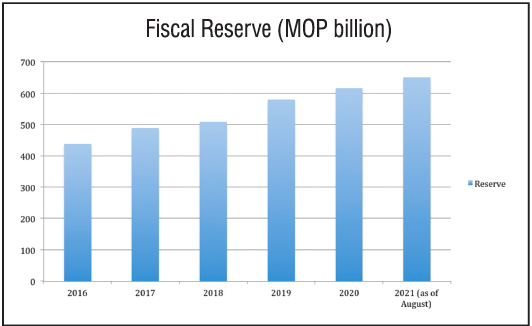
“Almost every industry, particularly the SMEs, have been particularly hard-hit by the pandemic while the grassroots in the community also face the soaring living costs. The authorities should input resources to help them overcome the current predicament,” she explains the rationale behind the group’s suggestions.
“The government should give confidence to the community in this challenging time,” she adds. “If the government doesn’t lead by example and input resources in the community, no one will follow suit.”
Gov’t repeats MOP130 bln gaming revenue estimate for 2022
The Macau SAR government is estimating that 2022 will end with MOP130 billion (US$16.2 billion) in gross gaming revenues, according to the budget proposal for next year submitted to the Legislative Assembly (AL).
Local authorities had made the same prediction for the current year, however, after outbreaks in the SAR and the mainland continued to impact visitor numbers, combined with the continuing shrinking of the VIP market pool, total results reached MOP72.1 billion by October, some 55 per cent of what was expected.
In 2019, before the pandemic outbreak, the city’s gaming sector generated a total of MOP292.5 billion in gaming revenue.
The Macau SAR has collected MOP27.2 billion in gaming taxes this year as of September, or about 55 per cent of the MOP50 billion estimate authorities expected to collect in 2021.
By 2022, authorities are expecting to collect MOP45.5 billion in gaming taxes, and since revenue to be collected next year was considered ‘insufficient to cover the expenses, local authorities have proposed to resort to MOP30 billion from the SAR financial reserves.
The AL approved yesterday a revision to the 2021 public budget to account for a MOP2.3 billion injection from the financial reserve to meet increased spending linked to policies to counter the current pandemic impact in the SAR.
With the new boost, the Macau government will have injected MOP84.5 billion to cover budgetary expenses since the start of the pandemic in 2020.





